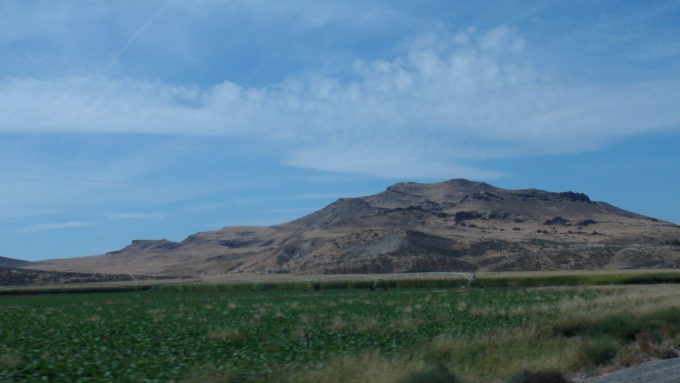
Wednesday, 29 July 2020
These are spots in your love feasts, while they feast with you without fear, serving only themselves. They are clouds without water, carried about by the winds; late autumn trees without fruit, twice dead, pulled up by the roots; Jude -12
Jude now turns from biblical examples of comparison about the perverted people he has been discussing, and he now makes comparisons to them from nature. In this verse, he will use three of them – spots, clouds without water, and late autumn trees without fruit. And so, he begins by saying, “They are spots in your love feasts.”
This is actually an unfortunate rendering which follows the error of the KJV. In a comparable passage found in 2 Peter 2:13, it says, “They are blots and blemishes.” There, he uses the Greek word spiloi. One can think of spilling something on clothes. That is an entirely different word than is used here. Rather, the Greek word spilades is used. It means “reefs” or “sunken rocks.”
What Jude is saying is that these people are like underwater obstructions that tear easily through a moving ship, causing it to be rent and destroyed. The symbolism is clear – a congregation which isn’t on guard against these types is doomed to share in their same fate.
As Jude ties them in with the “love feasts,” he is certainly saying that their conduct, during the time of fellowship and communion directed by the Lord (see Luke 22:14-22 and 1 Corinthians 11:17-26) will turn into an unholy gathering. They sneak into the congregation and turn this sacred time into a time of drinking and other perversion. This was evident at the time of Jude, and it is now found in countless major denominations and local churches today.
Jude then says this is all done “while they feast with you without fear.” They enter into the love feasts, they treat the entire occasion without any fear of God, and they introduce unholiness and ungodly practices into the rites of the church. There is no shame in their conduct, no care about what is passed down in Scripture, and no fear of the God who deemed it necessary to send Christ to die for sin, indicating that He is truly angry at sin.
Jude next says, “serving only themselves.” The word translated as “serving” signifies “shepherding.” In other words, there is no care for the flock, but rather they feed themselves, provide drink for themselves, and they ignore the others as they enter into debauchery and illicit conduct. They do not have the shepherding heart of the Lord, and they have no heart for the Lord as well.
Jude then says, “They are clouds without water, carried about by the winds.” In the arid regions of the world, or in any place that has sustained a long drought, this is easily understood. Long times of rainless skies cause the land to crack and moan for water and shade. Along come the highest wispy cirrus clouds which tempt the poor souls below with the prospect of shade and maybe even rain. But they provide neither. Instead, like these clouds, these unholy people look as if they will provide spiritual increase, but instead they are useless mirages, blown easily by the wind. They change their doctrine to suit their unstable souls, they have no substance, and they deprive those they instruct of any true spiritual invigoration.
Jude then calls them “late autumn trees without fruit.” Late autumn is when the trees are expected to bear fruit and yet they have none. Instead, they are barren of anything nourishing. Just as one tree will look like another, these people come in and appear to be bearers of fruit. But eventually, when it is too late for those who listen to them to find another source, it is discovered that nothing of value has been produced by them.
In this state, Jude then adds on another descriptor. When inspected more closely, it is determined that they are “twice dead” because their roots are already decayed. Any leaves were simply left over as the tree itself died away. After the autumn harvest, it is expected that the trees will lose their leaves and appear dead until spring comes again. But these people had no life in them all along. They aren’t just appearing “dead” after a fruitful harvest, they are already dead, and thus the final state of such a tree is to be “pulled up by the roots.”
It is a rejected plant that will burn in the fire because even its wood has suffered the decay of rot. Such will be the case with the refuse of sexually immoral, unrepentant souls who never believed the truth in Christ. They invade and corrupt the church of the Living God. Hell is their final destination.
Life application: In today’s world, saying words such as Jude has used would be considered “offensive.” Calling out sin results in the one who does so being called a bigot, a homophobe, or some other term intended to shut him up. But Jude sets the example here. He is direct and explicit in his condemnation of such people. As this is what the Bible conveys, it is what we are to also convey when faced with such people.
If a teacher is teaching immorality, heresy, or that which diminishes the reliability of the word of God, he is to be called out – even by name if necessary. This is not simply a matter of holding fast to the integrity of the church and the word for the sake of harmonious conduct. It is a matter of saving souls from the grasp of wolves. The people in such a congregation, if not alerted to the false nature of what is being presented to them, may never come to a saving knowledge of Jesus Christ. It is the duty and responsibility of those who see such conduct to call it out when the circumstances permit.
May we never be timid in our words when it comes to such things. Pray in advance for the internal strength to speak out, for wisdom in what to say, and then open your mouth and speak when the time is right.
O God, Your word presents a clear and unambiguous reminder that You will not tolerate sexual immorality in Your church. Those who sneak in and proclaim that they are free from the moral underpinnings of Your character are deceivers. Please alert us to such people who creep into the fellowship and attempt to infect the congregation with their immorality. May they be kept away from where we attend so that we can live holy and pure lives to You. Amen.




